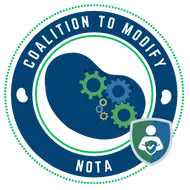
Legislative Act
Help us pass the End Kidney Deaths Act in 2024! Join our Team!
End Kidney Deaths Act Overview
All non-directed living donors of kidneys will receive $50,000 in the form of a refundable federal tax credit. The tax credit will be uniformly applied over a period of 5 years in the amount of $10,000 per year.
This tax credit is more cost-saving than other proposals (e.g., free healthcare for donors). A refundable tax credit is a credit you can get as a refund even if you don't owe any tax.
MOST AMERICANS FAVOR COMPENSATION FOR KIDNEY DONORS
Two research studies provide evidence that Americans are supportive. The first is from Johns Hopkins magazine. The second is from JAMA.
Legislative Language
An Act
To amend the Internal Revenue Code of 1986 to create a pilot program to offer refundable tax credit for living kidney donors for a total of $50,000 over five years.
Section 1. Short Title
This Act may be cited as the “End Kidney Deaths” Act.
Section 2. Clarifying the meaning of valuable consideration in the National Organ Transplant Act
Section 301 of the National Organ Transplant Act (42 U.S.C. 274e) is amended by adding at the end the following:
(d) Relation To Other Laws.—
“(1) GOVERNMENTS ENCOURAGING ORGAN DONATION.—This section shall not—
“(A) apply to actions taken by the Government of the United States.”
Section 3. Creation of refundable tax credits for non-directed living kidney donors.
(a) IN GENERAL.—Subpart C of part IV of subchapter A of chapter 1 of the Internal Revenue Code of 1986 is amended by inserting after section 36B the following new section:
“SEC. 36C. Tax credits for living kidney donors
(a) Allowance of credit- There shall be allowed as a refundable credit against the tax imposed by this chapter for the taxable year an amount equal to the sum of $10,000 for the taxpayer who donated their kidney for the purposes of making a non-directed kidney donation during the taxable year and for the following four taxable years.
(b) The credit described in subsection (a) shall only be allowed for taxpayers who donated their kidney for the purposes of their kidney to be transplanted into another individual's body in the years of () through ().
(c) For the purposes of this act, a non-directed kidney donation is a kidney donation where the donor donated their kidney to be transplanted into another individual's body and where the donor does not know the identity of the kidney recipient, prior to donating. For the purposes of this act, a non-directed kidney donation is a kidney donation where the donor donated their kidney to be transplanted into another individual's body and where the donor does not know the identity of the kidney recipient, prior to donating. Non-directed donors do not include people who are donating on behalf of a specific person in a paired exchange or chain donation.
Top Priorities: Ethics and Safety
Some have ethical and practical concerns:
Let’s discuss
Protecting Intrinsic Value
Skeptics Claim: Offering financial incentives for organ donation raises ethical questions. Critics argue that it commodifies the human body and creates a system where organs become a commodity to be bought and sold. This undermines the principle of altruism in organ donation and may exploit vulnerable individuals who may feel compelled to sell their organs for financial gain.
How we mitigate this concern:
Strict Eligibility Criteria, such as age requirements, medical disqualifiers, informed consent safeguards against coercion, and financial disqualifiers
Donor Protections such as prioritization of kidneys, reimbursement for lost wages, legal support, transportation assistance, legal protection, and life insurance coverage
Fair Compensation over a stable number of set years to protect and empower individuals to make the best decisions for themselves, with oversight
Stringent Safety Regulations: enhanced medical screering and evaluation alongside standardized national evaluation protocols
"In my professional experience, this proposal blends rigorous safety and ethical considerations, making compensated kidney donation a viable, safe, and respectful option for addressing the organ shortage."
- Dr. Matt Harmody, Emergency Room MD, Non-Directed Kidney Donor
Preventing Exploitation of Vulnerable Americans
Skeptics Claim: Critics argue that a tax credit for living kidney donations may disproportionately affect low-income individuals. Those who are financially disadvantaged may be more likely to be enticed by the monetary reward, leading to a situation where the poor are coerced into making life-altering decisions to meet their economic needs.
How we mitigate this concern:
Culturally Competent Education and Outreach through enhanced culturally-competent-engagement, and collaboration with community organizations
Independent Evaluation through the appointment of neutral third parties, ensuring informed consent, assessing psychological well-being, confidentiality, and privacy
Creating Safeguards Against Coercion through independent evaluation, and implementing a mandatory cooling period through the rigorous evaluation process
Transparency and Oversight by establishing a regulatory body, reporting and monitoring mechanisms
"With the proposed safeguards and education, this plan provides a mindful approach to kidney donation, protecting those most vulnerable while meeting urgent needs."
- Trisha Phillips, Kidney Donor
Community Organizer/ Advocate
Overcoming Legal and Economic Challenges
Skeptics Claim: The amount of regulatory oversight, coordination across different agencies, and political partnership might prove to be an insurmountable hurdle. Additionally, the financial systems would have to track, distribute and monitor this tax credit system.
How we mitigate this concern:
Passage of a modification the National Organ Transplantation Act of 1984 will allow for the tax credit compensation systems
Establish the Kidney Donor Compensation and Protection Agency under the juristiction of the department of Health and Human (HHS)
Collaborate with the Internal Revenue Service (IRS) to facilitate the distribution of tax credits.
Work with national kidney exchange networks and transplant centers through oversight, data exchange, and identification of best practices
"This proposal bridges economic, legal, and logistical challenges through an achievable overhaul of the NOTA, collaboration with federal entities like the IRS, and fostering partnerships with existing organ networks. It's an economically prudent solution to the organ shortage."
- Sally Satel, MD, Yale Lecturer, Senior Fellow AEI, and Kidney Recipient
Safeguarding the Slippery Slope
Skeptics Claim: Embracing a system that commodifies body parts creates a dangerous ethical precedent. Once we normalize the notion of buying and selling organs, we risk extending the practice to other body parts, potentially leading to the exploitation and dehumanization of individuals. It opens the door to a future where the wealthy can purchase health and longevity, further exacerbating existing social inequalities.
How we mitigate this concern:
Implementing ethical oversight and regulations that allow bioethicists, transplant healthcare professionals, living organ donors, and kidney disease patients.
Building broad societal consensus around the unique nature of kidneys and normalizing the compensation of these organs as we do with blood, plasma, eggs, surrogate pregnancies, etc.
"Compensating kidney donors does not equate to commodification. With careful ethical oversight and societal consensus, we can ensure the practice remains focused on maintaining donor safety above all else - while saving countless lives by creating a more equitable system for all donors and recipients."
- Kari Rancourt, Living Donor Coordinator / Non-Directed Kidney Donor











